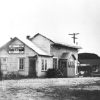calsfoundation@cals.org
William Harvey Bowen (1923–2014)
William Harvey Bowen was a senior partner in Arkansas’s largest law firm, president of the state’s largest bank, chief executive officer of a health insurance company, and dean of the state’s largest law school, which was later named the University of Arkansas at Little Rock William H. Bowen School of Law. He was a friend and adviser to Bill Clinton and managed the governor’s office for a year while Clinton was running for president. He was also a friend and adviser to Dale Bumpers and David Pryor when they were governors and U.S. senators.
William H. Bowen was born on May 6, 1923, in Altheimer (Jefferson County), one of five children of Robert J. (Bob) Bowen, who farmed and managed a cotton gin and general store, and Ruth Falls Bowen, a schoolteacher. In his 2006 memoir, The Boy from Altheimer, Bowen recounted the grueling hardship of life in the Mississippi Delta: living for weeks on the second floor of the local school during the Flood of 1927, the succeeding droughts that drove farmers from the land, President Herbert Hoover’s declaration that it was not the government’s function to help these farmers, and the Great Depression that left neighboring tenant farmers, Black and white, penniless and starving until the government finally delivered relief.
Bowen graduated from high school in 1941 and briefly attended Henderson State Teachers College (now Henderson State University) in Arkadelphia (Clark County) before joining the U.S. Navy in December 1942. He trained to fly from aircraft carriers in the Pacific Ocean, but the war ended before he could put his training to use.
He enrolled at the University of Arkansas (UA) in Fayetteville (Washington County) in 1946 and then in its law school. He married Connie Wanasek, a student and an employee of the registrar’s office. They went on to have a son and two daughters. He graduated from law school in 1949, worked briefly for a Pine Bluff (Jefferson County) law firm, and then undertook graduate study in tax law at New York University.
In 1950, Bowen became law clerk to Judge Bolon B. Turner of the U.S. Tax Court in Washington DC. Two years later, he joined the Trial Section of the U.S. Justice Department’s Tax Division as special assistant to the attorney general. He tried tax cases in federal district and appeals courts across the South, including Arkansas. In 1954, he joined the Little Rock (Pulaski County) law firm of Mehaffy, Smith and Williams as a trial tax specialist, switching from defending the government to defending taxpayers. It would soon become Mehaffy, Smith, Williams, Friday and Bowen.
His first big case was a suit against the state in which he represented W. R. “Witt” Stephens, the founder of Stephens, Inc., and president of Arkansas Louisiana Gas Co. He sought a $500,000 refund for Stephens, who maintained that he did not owe the taxes on his purchase of the controlling stock in the gas company because he closed the deal in New Jersey, rather than Arkansas, to escape excise taxes levied by New York and Arkansas, where the negotiations occurred. Bowen won the case at the Arkansas Supreme Court and billed Stephens $55,000, which he paid unhappily.
In 1962, Bowen represented Little Rock’s four large banks opposing an effort by insurance executive Jess Odom to charter a new bank in the city. They revealed that Odom had been found guilty of civil fraud in the formation of his insurance company, and the comptroller of the currency denied the bank charter. Additionally, Bowen successfully defended Governor Orval Faubus when the Internal Revenue Service tried to collect income taxes on the rental value of the Governor’s Mansion. He also defended state senator Q. Byrum Hurst of Hot Springs (Garland County), who was charged with federal tax evasion. Bowen called the notorious Prohibition-era gangster Owney Madden (then living in Hot Springs) to the stand in Hurst’s 1963 trial to testify about his loans to Hurst. Hurst was acquitted but was convicted of tax evasion eleven years later.
In 1964, a front-page article in the Arkansas Gazette listed Bowen as the leading prospect to succeed Governor Faubus, who for a time was not expected to run again. Faubus did run again, however, and remained governor until 1967.
Bowen became general counsel for the Arkansas Bankers Association, and in 1970, Richard C. Butler approached Bowen about succeeding him as president of Commercial National Bank, then the fourth-largest bank in Little Rock. Bowen became president in May 1971 and began an aggressive campaign to build the bank. The bank went after depositors, and, as a result, saw its assets, net income, and shareholder equity increase.
In 1983, after a protracted fight with competing banks, Commercial and First National Bank merged into the successor First Commercial National Bank, becoming Arkansas’s largest bank and its first multi-bank holding company. Days before the merger was to be implemented, Jackson T. Stephens, the president of Stephens, Inc., invited Bowen to his office, where Stephens and allied banking interests told him that the Stephens family and trust would file a proposal the next morning to acquire control of First Commercial. The bank fought off the hostile takeover, however, and the merger was implemented. Bowen became board chairman and president of both the bank and the holding company. He retired in 1990.
When Bill Clinton decided in the summer of 1991 to run for president, he asked Bowen to become his chief of staff. It was widely viewed as a move by Clinton to prevent the lieutenant governor, Jim Guy Tucker, from assuming full power in his absence. A George Fisher cartoon in the Arkansas Gazette showed Clinton, suitcases in hand, walking out of his office, with a grinning Bowen seated at his desk and a brooding Tucker mopping the floor in the background. In August 1993, President Clinton planned to appoint Bowen chief executive of the Farm Credit Administration, but Bowen wrote him to say that it would not be wise to appoint a commercial banker to the position in the competitive environment of banking and the farm credit system.
In the 1990s, Bowen became president of a new health management organization (HMO), Healthsource Arkansas, a partnership of Healthsource, Inc., of New Hampshire and the St. Vincent Infirmary medical system. However, after two years, he returned to the law. Faculty members at the University of Arkansas at Little Rock School of Law urged the chancellor to make Bowen the dean for two years to build the school’s development program while it held a national search for a new dean. Bowen became the dean in July 1995; he stepped down in 1997. In 1998, he gave the school $2.5 million, the largest gift in its history, to establish a scholars’ program. In 1999, the school’s faculty renamed the school the William H. Bowen School of Law.
In 2009, at the age of eighty-seven, Bowen was appointed justice of the Arkansas Supreme Court by Governor Mike Beebe to complete the term of retiring Justice Annabelle Clinton Imber, but he resigned after a week, saying that he was not physically up to the task.
Early in his legal career, Bowen was president of the Little Rock Chamber of Commerce. He was also president of the Pulaski County Bar Association, chairman of the board of the Arkansas Arts Center (now the Arkansas Museum of Fine Arts), a member of the Federal Advisory Council to the Federal Reserve. For twenty-two years, he taught an annual course on ethics in banking at the Stonier Graduate School of Banking at Rutgers University in New Jersey.
Bowen died on November 12, 2014.
For additional information:
Bowen, William H. The Boy from Altheimer: From the Depression to the Boardroom. Fayetteville: University of Arkansas Press, 2006.
Oman, Noel. “Bowen, LR Lawyer of Many Talents, Dies.” Arkansas Democrat-Gazette, November 14, 2014, pp. 1A, 7A.
Ernest Dumas
Little Rock, Arkansas









Comments
No comments on this entry yet.